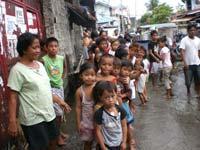Gangs use pregnant women to smuggle unborn babies

Philippine social workers have uncovered the trafficking of unborn babies overseas.
The country’s social welfare undersecretary Alicia Bala says pregnant Filipino women have been recruited to travel overseas legally as tourists, before selling their newborns to waiting adoptive parents.
Two such cases were reportedly disclosed in an international forum on child welfare services held in Manila - one in Austria and another, in Malta.
The senior official said such cases are difficult to detect unless reported by the receiving country.
She suggested authorities be on guard against possible facilitators who may be behind the pre-arranged sale of newborns.
Bala disclosed the newest form of child trafficking at the recent 11th Global Consultation on Child Welfare Services in Makati City.
Speaking about the latest case in Malta, Bala said: “The mother who’s pregnant [was] sponsored to go to that place with the intent of having the child adopted.”
“This is a form of trafficking… Our attention was called by Malta authorities,” she told reporters.
The mother has returned to the country but her child is now undergoing procedure for adoptive parents to keep the baby in custody.
“This is just one instance but, who knows, there may be other cases that are not brought to our attention. It is a prearranged plan of giving birth there, then they give the baby up. They don’t keep the baby because there is already that intention to have the baby adopted abroad,” Bala said.
As the mothers are able to exit the country legally, such cases are hard to detect unless reported by the receiving country, Bala said.
“You can’t stop anyone from traveling. There’s no reason for immigration agents to be suspicious about why a pregnant woman is going overseas. Maybe there’s a facilitator here,” Bala said.
In 2009, Australia’s chief federal magistrate John Pascoe urged Asian nations to track child-trafficking gangs were moving pregnant women from country to country, then waiting for them to give birth before selling their babies.
The children have no official identity or proven nationality and, therefore, an identity can be easily forged, he said.
John Pascoe said the infants were being sold mainly for illegal adoption but also for sexual exploitation, slavery and begging.
He said demand for babies who only knew their adoptive parents was high. “More importantly, the children have no official identity or proven nationality and, therefore, an identity can be easily forged to suit the purpose for which they are intended,” Pascoe said in Singapore, addressing a conference then on the trafficking in unborn children.
“This includes the ability to forge paperwork for adopting parents who could easily be deemed the child’s biological parents.
“Alternatively, as the children are born outside of any formal health clinics, there may be no need for any paperwork at all.
“There would be no official documentation to indicate the baby was not the child of the adoptive parents or indeed that it even exists.”
Pascoe spoke of a case in November when Malaysian authorities raided two houses in response to a tip-off that they were being used to foster illegal immigrants from Indonesia.
Two women, both in an advanced stage of pregnancy, were arrested.
Also in the house were two babies whose mothers could not be found.
In the second house were found identity certificates, birth certificates, child adoption forms and other documents used to create false identities. Five Indonesian women and two Indonesian men were arrested.
The magistrate becams an outspoken critic of child trafficking since visiting Thailand, Burma and Laos, where he met women who had become victims of the trade. They had contracted HIV and been sent home to die.
“One of the alarming dangers where countries have inconsistent laws, especially between neighbouring countries, is that as unborn children are not recognised as people,” he said.
“Traffickers may move an unborn child from a country with strict laws to be exploited in a country with more relaxed laws.”
The trafficking of people, including children and babies, is big business. It is estimated by the United Nations to have a total market value of US$32 billion. But traffickers have realised that pregnant women are the best way to move babies across borders without detection
The latest reports in Manila surfaced after the Philippines overcame its status as among nations in the United States’ Tier 2 human trafficking watch list.
Between 400 and 500 Filipino children, among them orphans and abandoned children, are adopted by overseas parents under a Philippine system managed by the Inter-Country Adoption Board.









